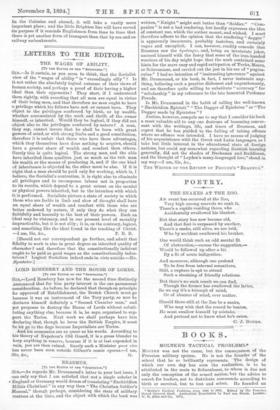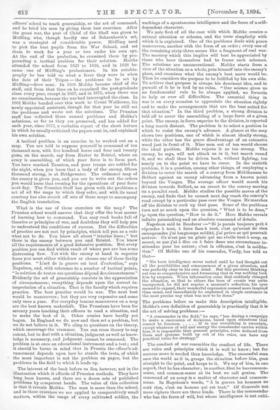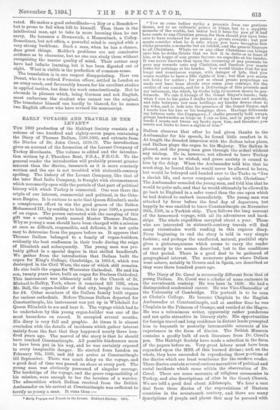BOOKS.
MOLTKE'S TACTICAL PROBLEMS.*
MOLTKE was not the cause, but the consequence, of the Prussian military system. He is not the founder of the school that he so brilliantly represents. The design of which our own day has seen the realisation, is to be attributed in the main to Scharnhorst, to whom is due not only the conception of the armed nation, but the advice to search for leaders, not to distribute commands according to birth or survival, but to test and select. He founded an * Mot/he's Tactical Problons, from 1858 to MB. Edited by the PTI199ift11 Grand General Staff. Authorised Translation by Karl von Donat. London; W. 11, Allen and 00, 1894. officers' school to teach generalship, or the art of command, and he tried his men by giving them test exercises. Alter the great war, the post of Chief of the Staff was given to Muffling, who, though hardly one of Scharnhorst's set, was a strategist of considerable power. Muffling used to pick the best pupils from the War School, and set them to work for a year or two under his own eye. At the end of the probation, he examined them by pro- pounding a tactical problem for their solution. Moltke attended the school from 1823 to 1826, and in 1828 be- came one of Miiffling'e probationers. In his autobio- graphy he has told us what a fever they were in when the date of their Tripos — the problems to be set by Mfiffiing—drew near. In 1858 Moltke became chief of the staff, and from that time on he examined the post-graduate class every year, except in 1867, and in 1871, when there was no examination, because the war had interrupted the class, In 1882 Moltke handed over this work to Count Waldersee, his newly appointed assistant, though for that year he still set the problems and wrote out the solutions, The Prussian staff has collected these annual problems and Moltke's solutions, so far as they are preserved, and has added for each year, since 1872, a verbatim report of the short lecture in which he usually criticised the papers sent in, and explained his own solution.
A tactical problem is an exercise to be worked out on a map. You are told to suppose yourself in command of ten thousand men, with five hundred horse and four and twenty guns, on the march, say from Exeter to Bristol, where an army is assembling, of which your force is to form part. You have reached Taunton, and your troops are settled for the night, when you learn that a body of the enemy, fifteen thousand strong, is at Bridgewater. The ordnance map of the county is given you, and you are to write out the orders you would issue that evening for the operations of your force next day. The Prussian Staff has given with the problems a set of all the maps to which they refer, and with its usual courtesy has also struck off sets of these maps to accompany the English translation.
What is the use of these exercises on the map ? The Prussian school would answer that they offer the best means of learning how to command. You may read books full of theories or principles of war, and doubtless they will help you to understand the conditions of success, But the difficulties of practice are not met by principles, which tell you as a rule what not to do. You know all about "interior lines ; " but there is the enemy between you and Bristol. You know all the requirements of a good defensive position. But every position you can find within reach of where you are has some distressing flaw. Yet with the enemy at hand in superior force you must either withdraw or choose one of these faulty positions. " L'art de la guerre est tout d'execution," says Napoleon, and, with reference to a number of tactical points, " la solution de toutes °es questions depend des circonstances." Evidently the art of generalship consists in the appreciation of circumstances ; everything depends upon the correct in- terpretation of a situation, That is the faculty which requires practice. The best practice would be war. The next best would be manceuvres ; but they are very expensive and come only once a year. For everyday lessons manceuvres on a map are the best known makeshift. The Prussians have been for seventy years teaching their officers to read a situation, and to make the best of it. Other armies have hardly yet begun. In England we do now and then set a problem, but we do not believe in it. We cling to questions on the theory, which encourage the crammer. You can cram theory to any extent, but to deal with a situation, judgment as well as know- ledge is necessary, and judgment cannot be crammed. The problem is at once an educational instrument and a test ; and it should be borne in mind that in Prussia the officer's ad- vancement depends upon how he stands the tests, of which the most important is not the problem on paper, but the problems in the field to which it leads up.
The interest of the book before us lies, however, not in the illustration which it affords of Prussian methods. They have long been known, and there are a dozen sets of published problems by competent hands. The value of this collection is that it reveals Moltke. The man is more than the school, and in these exercises we see applied to comparatively small matters, within the range of every cultivabed soldier, the workings of a spontaneous intelligence and the force of a self:.
dependent character.
We note first of all the ease with which Moltke creates w natural situation or scheme, and the terse simplicity with which it is explained. One of the problems deals with peace manceuvres, another with the form of an order; every one of the remaining sixty-three seems like a fragment of real war. The mastery which this implies will best be appreciated by those who have themselves had to frame such schemes.
The solutions are unconventional. Moltke starts from a. view of the situation as a whole, puts himself into the enemy's place, and examines what the enemy's best move would bee Then he considers the purpose to be fulfilled by his own side. To achieve that purpose is always his dominant idea, and he pursuit of it he is tied by no rules. "Our science gives ma no fundamental rule to be always applied, no formula to help us over all difficulties. The essential thing in war is on every occasion to appreciate the situation rightly and to make the arrangements that are the beat suited for that situation." In the third problem, a strong division is told off to cover the assembling of a large force at a given point. The enemy, in force superior to the division, is reported a long march distant. The problem is to select a position in which to resist the enemy's advance. A glance at the map shows two positions, one of which is almost ideally strong), while the other has the grave disadvantage of an extensive wood just in front of it. Nine men out of ten would choose the ideal position. Moltke rejects it as too strong. The enemy, he says, will not attack us in it, but march round it, and we shall thus be driven back, without fighting, too nearly on to the point we have to cover. In the sixtieth problem, it is a question, among other things, of employing a division to cover the march of a convoy from Miihlhansen to Belfort against an enemy advancing from a known point beyond the Vosges. The average officer would march his division towards Belfork as an escort to the convey moving on a parallel road. Moltke studies the possible moves of the enemy, and finds that he cannot next day reach the convoy's road except by a particular pass over the Vosges. He marches off the division to cork up that pass. Some of the problems turn not so much upon the question, "What is to be done," upon the question, "How to do it." Here Moltke reveals infinite painstaking and an absolute command of details.
Napoleon said to Roederer :—" Si je parais tonjours pret repondre h tout, it faire face it. tout, c'est qu'avant de rien entreprendre j'ai longtemps medite, j'ai prevu ce qui pourrait arriver. Ce n'est pas nn genie qui me revele tout it coup, en secret, cc que j'ai it dire on it faire dans une oirconstance in attendue pour lea autres ; c'est la rellexion, c'est Is, =Mita- tion." Of Moltke one of his comrades, Verdy, has told us that— "His keen intelligence never rested until he had thought out all the possibilities and consequences of a given situation, and was perfectly clear in his own mind. But this previous thinking out was so comprehensive and foreseeing that in war nothing took him by surprise. When information came that suddenly changed the situation, so that to others the turn of events was quite unexpected, he did not require a moment's reflection, his eyes seemed to expand, their wonderful expression seemed more inspired than usual, and immediately he explained in simple sentences in the most precise way what was now to be done."
The problems before us make this description intelligible. Moltke's own definition of generalship is practically that it is the art of solving problems :— " A commander in the field," he says, "has during a campaign to make a succession of decisions, based upon situations that cannot be foreseen If in war everything is uncertain, except whatever of will and energy the commander carries within him, it is impossible that general principles, rules deduced from them and systems built up out of the rules, can have any practical value for strategy."
The conduct of war resembles the conduct of life. There are rules and principles which it is well to know; but for • success more is needed than knowledge. The successful man, sees the world as it is, grasps the situation before him, goes straight to the point, and keeps to it. We say of him, in one aspect, that he has character; in another, that he has common- sense, and common-sense at its best we call genius. The command of an army is a matter of character and common- sense. In Napoleon's words, "A la guerre lea hommes ne- sont rien, &est un homrae qui est tout." Of Generals not. mere ciphers there are three kinds. There is the commander who has the force of will, but whose intelligence is not cattle. vated. He makes a good subordinate—a Ney or a Benedek- but is prone to fail when left to himself. Then there is the intellectual man, apt to take in more learning than he can carry. He becomes a Brunswick, a Massenbach, a Colley. Sometimes, but not often, a powerful mind is coupled with a very strong backbone. Such a man, when he has a chance, does great things. Moltke's problems are not conclusive evidence as to character, but no one can study them without recognising the master quality of mind. Their author may have had infinite learning, but it has been digested out of sight. What is visible is the perfection of common-sense. The translation is in one respect disappointing. Herr von Donat, who is a retired Prussian officer, settled in London as an army coach, and favourably known for his excellent studies in applied tactics, has done his work conscientiously. But he abounds in phrases which, being German and not English, must embarrass the student who cannot use the original. The translator himself can hardly be blamed, for he names two English officers who have revised his manuscript.




















































 Previous page
Previous page